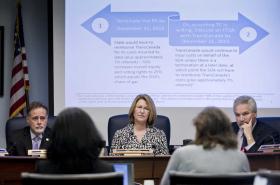A drop in global natural gas prices due to falling demand has made Alaska’s natural gas pipeline project questionable, a joint session of the Alaska House and Senate resources committees was told Wednesday in Anchorage.
“Our cost-competitiveness is still at issue,” said Steve Butt, project manager of AKLNG, the effort to build an 800-mile pipeline from the North Slope to Cook Inlet tidewater.
Globally, natural gas prices are linked to crude oil prices. At low oil prices, it becomes more cost-efficient to generate electricity from diesel and other oil-based sources. Natural gas demand falls. At higher oil prices, natural gas is more affordable and preferred. Natural gas demand rises.
Alaska’s natural-gas pipeline is intended to supply Asian markets, but it would compete with several other planned natural gas projects around the world, and the economics of those projects appears better than Alaska’s project, said David Barrowman, an analyst testifying before the joint committee.
“The competitiveness of Alaska LNG does not rank well … with other peer projects that could supply North Asia,” Barrowman said. “Even if oil prices rose to around $70 barrel, it would be difficult to make successful returns.”
Barrowman represented Wood Mackenzie Limited, a firm of natural resource analysts hired by BP Alaska Inc., ExxonMobil Alaska LNG and the Alaska Gasline Development Corp.
The state of Alaska owns one quarter of the pipeline project alongside BP, ExxonMobil and ConocoPhillips.
According to Barrowman’s presentation, Alaska has cheaper gas and lower transportation costs than gas fields in Canada, Australia, the Gulf of Mexico or eastern Africa, but the cost of building an 800-mile pipeline and sophisticated industrial plants at either end of that pipeline will make it uncompetitive except at high prices.
Barrowman said the picture isn’t entirely gloomy for Alaska. Buyers don’t just purchase based on cost.
If I’m a purchaser, he said, “I don’t want to be buying from a country that may turn into a conflict zone fairly quickly.”
The project comparison also doesn’t take into account things like job creation in Alaska or the availability of natural gas to Alaskans, things that might be worth money but don’t show up on a strict balance sheet.
Furthermore, the state can lower the cost of the project through different financial structures that allow the AKLNG partners to borrow money more cheaply. Successfully doing that would make the project more competitive.
“I was expecting doom and gloom, and I’m actually feeling a little optimistic at this point,” said Sen. Bill Wielechowski, D-Anchorage.
Barrowman said that finding someone to take on a portion of the project’s financing in exchange for a guaranteed return might be difficult.
The project also faces a big hurdle in the coming months as the project nears the end of its pre-engineering phase.
This fall, the project’s four partners will vote to decide whether to continue into front-end engineering and design, the last stage before construction. That vote is expected in early 2017, with a decision on construction expected in 2019. The pipeline could be complete as early as 2023.
In the coming months, the Alaska Gasline Development Corporation, which is coordinating AKLNG, will submit a proposed fiscal year 2018 budget to the Alaska Legislature.
• Contact James Brooks at james.k.brooks@juneauempire.com or call (907) 523-2258.

